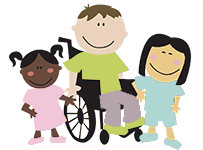Whether it’s realizing that they’ve just walked by a friend without so much as a glance, nod, or wave, much less a “hello,” or recognizing the confusion and pain that has registered on that friend’s face, sometimes the weight of reading another person is simply too heavy for a child contending with pragmatic or social language weaknesses. Too heavy, that is, until they have a little help shouldering the load!
P ragmatic language skills are critical for navigating a child’s way through the adventure of their unique lifetime. Learning to decode the non-verbal language so many of us are fluent in can be a true challenge for a child who doesn’t appear to understand the subtle changes that even a change in tone of voice may imply. When most words are taken literally in an environment steeped in figurative language, it shouldn’t come as a surprise that many of the precious children living with a diagnosed pragmatic language disorder, or even social language weaknesses, are both exhausted and discouraged by the daunting unknowns of a typical school day, a birthday party or baseball practice.
ragmatic language skills are critical for navigating a child’s way through the adventure of their unique lifetime. Learning to decode the non-verbal language so many of us are fluent in can be a true challenge for a child who doesn’t appear to understand the subtle changes that even a change in tone of voice may imply. When most words are taken literally in an environment steeped in figurative language, it shouldn’t come as a surprise that many of the precious children living with a diagnosed pragmatic language disorder, or even social language weaknesses, are both exhausted and discouraged by the daunting unknowns of a typical school day, a birthday party or baseball practice.
Learning to translate these mysteries into sizeable and manageable nuggets happens to be one of the most treasured privileges enjoyed by speech-language pathologists. A clinician may use puppets and figurines, carefully tailored social stories, video taped samples of typical social interaction and role play to systematically build a child’s repertoire so they are better equipped to react well given expected and even novel social situations. On occasion, clinicians may recruit cherished siblings or peers both with and without pragmatic disorders to aid in the carry-over of social scripts and schemes. Children may also address pragmatic needs with a partner, typically called a “dyad” session, or within a small group of several additional children hand-selected to aid and support one another as they pursue their skills in a larger setting.
Please feel free to contact Speech and Occupational Therapy of North Texas with any questions regarding individual, dyad or group pragmatic language therapy for your child, as our clinicians truly can’t wait to start helping them in the most efficient and enjoyable manner possible!

Comments (0)